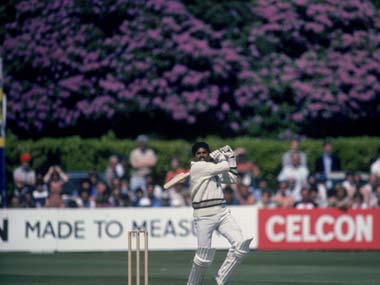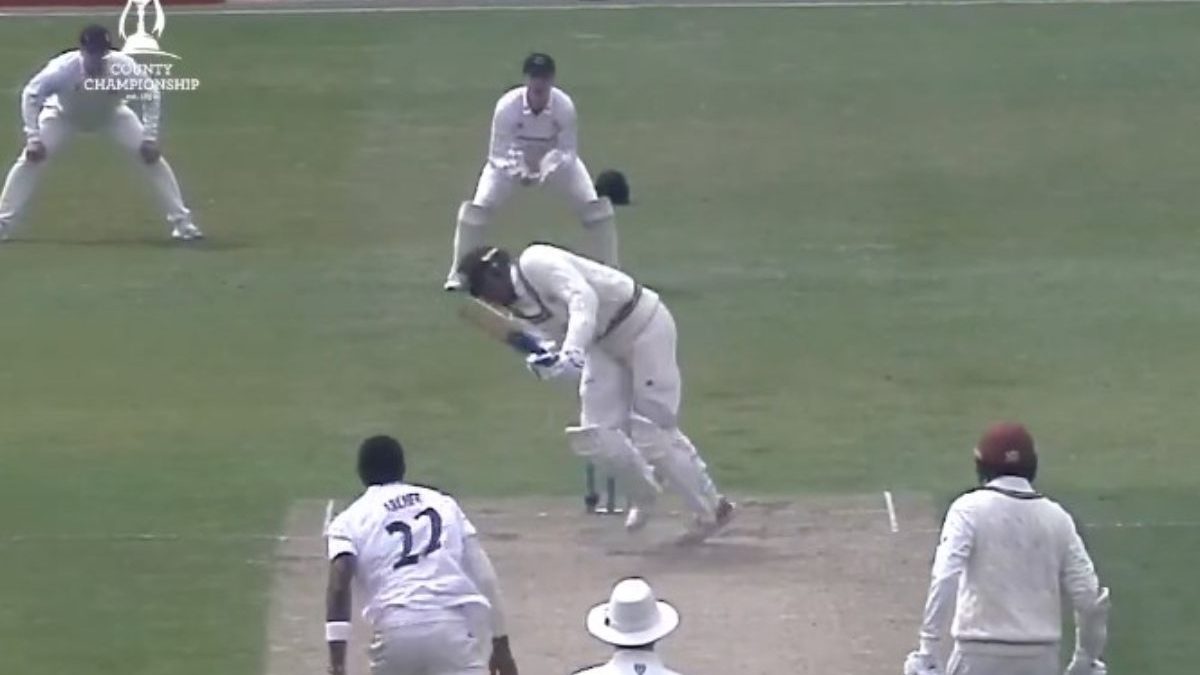Graeme Hick has a unique view on Kapil Dev’s 175 — listen to the interview above
With due respect to Sachin Tendulkar, Virat Kohli and Rohit Sharma, India’s best one-day innings is Kapil Dev’s 175 not out at Turnbridge Wells against Zimbabwe in the 1983 World Cup. You don’t have to take my word for it either. Sunil Gavaskar thinks it is the best one-day innings ever.
He might have a point.
The stakes were high – a place in the World Cup semis was on the line. The situation was desperate – India were 9 for 4 when Kapil walked out to bat and 17 for 5 shortly after.
There was personal pressure too. It is easy to forget Kapil was just 24 at the time and a new captain. “Few thought, least of all his team-mates, he [Kapil> was fit to be captain,” Sambit Bal later wrote for ESPNcricinfo . “He had been pitch-forked in to the job only four months earlier when India lost a Test series to Pakistan and Sunil Gavaskar had to pay the price. He was gauche, strategically naïve, and was still trying to come to terms with his sudden elevation.”
And now he had to dig his team out of a Godzilla-sized hole.
Zimbabwe’s new ball pair of Peter Rawson and Kevin Curran had demolished India’s top order. Gavaskar and Kris Srikanth were out for ducks as they failed to cope with seam and bounce. Mohinder Amarnath, Sandeep Patil and Yashpal Sharma fared no better as Dave Houghton took three catches behind the stumps.
At this stage, “the organisers of the match by now were getting worried, afraid that the match would be a fiasco and over by lunchtime,” John Ward reported . “They mentioned their fears to Dave Ellman-Brown [the Zimbabwe Cricket Union chairman>, who cautiously advised them that things could still change. The BBC, anticipating a startling Zimbabwean victory, phoned him as well, intending to come over and do an interview. He told them too, ‘The game is not over,’ and so it proved.”
Roger Binny initially hung around with Kapil but after adding 60 together, India lost Binny and Ravi Shastri in quick succession. At 78 for 7, the team was still a long way from exhaling.
India did bat deep, however, and Zimbabwe captain Duncan Fletcher had taken off Rawson and Curran. Madan Lal chipped in with 17 from 39 balls and helped take his team to 140. That’s when Syed Kirmani walked out to the middle and confidently told Kapil , “You just play your natural game.” To which Kapil replied: “Humko 60 overs khelna hai”. “I told him that I would try my best to hold one end up.”
To be fair, Kapil benefitted from a lopsided ground. The pitch was on the very edge of the square, shortening one boundary and lengthening the other. It was “possible for batsmen to run three for a hit about ten metres to the side of a boundary fielder on [one> side, while on the other side two runs were impossible for the same hit,” Ward wrote. “On the other hand, of course, fours and sixes were so much easier to hit on [the shorter> side; a strong hit only a few yards from a boundary fielder would invariably beat him for four.”
Kapil clinically exploited the lopsided ground, smashing most of his 16 fours to the short boundary. The majority of his six sixes, however, came on the opposite side and were far from freebies, according to Ward. Kapil’s hundred came from 72 balls and by the time 60 overs had been bowled, Kapil had amassed 175 from 138 balls. Together with Kirmani, he added 126 for the ninth wicket, of which Kirmani’s contribution was 24 from 56 balls.
Balvinder Singh Sandhu was padded up as the next man but didn’t have to bat. In 2013, he told Cricket Country that “all those sixes went 10 to 15 yards out of the ground. It was tremendous hitting. And very, very calculated hitting. Not slogging but calculated hitting … Only Kapil could play an innings like that.”
Such was the ferocity and poise of Kapil’s innings that Gavaskar was moved to meet his rival for captain with a glass of water as Kapil came off the field.
India posted 266 for 8 and though Zimbabwe made a fist of it while Curran was at the crease, they would be bowled out for 235 with three overs to spare.
“There was no TV, of course, so we relied on the radio commentary from then on,” former Zimbabwe batsman Alistair Campbell wrote on gulfnews.com last month. “I’ll never forget listening when India were reduced to 17-5. We assumed somebody must have tuned into the wrong station. Maybe it was a hoax? Then Kapil Dev smashed 175 and ended the dream in emphatic fashion.”
For India, however, the dream was just beginning.


)




)
)
)
)
)
)
)
)